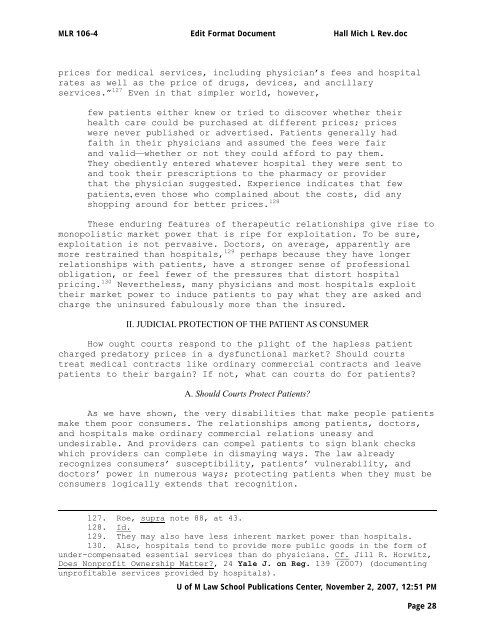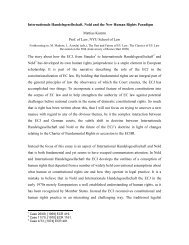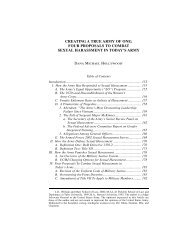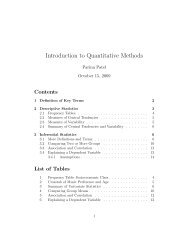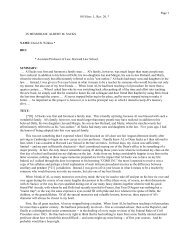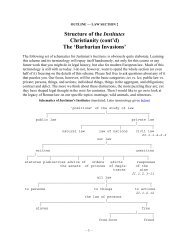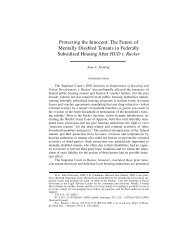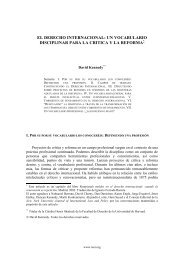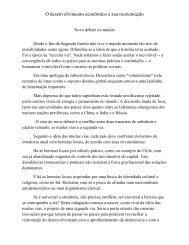Patients as Consumers - Harvard Law School
Patients as Consumers - Harvard Law School
Patients as Consumers - Harvard Law School
You also want an ePaper? Increase the reach of your titles
YUMPU automatically turns print PDFs into web optimized ePapers that Google loves.
MLR 106-4 Edit Format Document Hall Mich L Rev.doc<br />
prices for medical services, including physician’s fees and hospital<br />
rates <strong>as</strong> well <strong>as</strong> the price of drugs, devices, and ancillary<br />
services.” 127 Even in that simpler world, however,<br />
few patients either knew or tried to discover whether their<br />
health care could be purch<strong>as</strong>ed at different prices; prices<br />
were never published or advertised. <strong>Patients</strong> generally had<br />
faith in their physicians and <strong>as</strong>sumed the fees were fair<br />
and valid—whether or not they could afford to pay them.<br />
They obediently entered whatever hospital they were sent to<br />
and took their prescriptions to the pharmacy or provider<br />
that the physician suggested. Experience indicates that few<br />
patients, even those who complained about the costs, did any<br />
shopping around for better prices. 128<br />
These enduring features of therapeutic relationships give rise to<br />
monopolistic market power that is ripe for exploitation. To be sure,<br />
exploitation is not perv<strong>as</strong>ive. Doctors, on average, apparently are<br />
more restrained than hospitals, 129 perhaps because they have longer<br />
relationships with patients, have a stronger sense of professional<br />
obligation, or feel fewer of the pressures that distort hospital<br />
pricing. 130 Nevertheless, many physicians and most hospitals exploit<br />
their market power to induce patients to pay what they are <strong>as</strong>ked and<br />
charge the uninsured fabulously more than the insured.<br />
II. JUDICIAL PROTECTION OF THE PATIENT AS CONSUMER<br />
How ought courts respond to the plight of the hapless patient<br />
charged predatory prices in a dysfunctional market? Should courts<br />
treat medical contracts like ordinary commercial contracts and leave<br />
patients to their bargain? If not, what can courts do for patients?<br />
A. Should Courts Protect <strong>Patients</strong>?<br />
As we have shown, the very disabilities that make people patients<br />
make them poor consumers. The relationships among patients, doctors,<br />
and hospitals make ordinary commercial relations une<strong>as</strong>y and<br />
undesirable. And providers can compel patients to sign blank checks<br />
which providers can complete in dismaying ways. The law already<br />
recognizes consumers’ susceptibility, patients’ vulnerability, and<br />
doctors’ power in numerous ways; protecting patients when they must be<br />
consumers logically extends that recognition.<br />
127. Roe, supra note 88, at 43.<br />
128. Id.<br />
129. They may also have less inherent market power than hospitals.<br />
130. Also, hospitals tend to provide more public goods in the form of<br />
under-compensated essential services than do physicians. Cf. Jill R. Horwitz,<br />
Does Nonprofit Ownership Matter?, 24 Yale J. on Reg. 139 (2007) (documenting<br />
unprofitable services provided by hospitals).<br />
U of M <strong>Law</strong> <strong>School</strong> Publications Center, November 2, 2007, 12:51 PM<br />
Page 28


